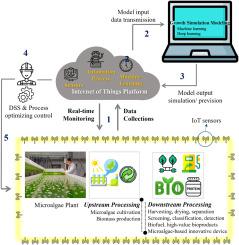Biotechnology Advances ( IF 12.1 ) Pub Date : 2021-08-25 , DOI: 10.1016/j.biotechadv.2021.107819 Kexin Wang , Kuan Shiong Khoo , Hui Yi Leong , Dillirani Nagarajan , Kit Wayne Chew , Huong Yong Ting , Anurita Selvarajoo , Jo-Shu Chang , Pau Loke Show

|
Microalgae biorefinery is a platform for the conversion of microalgal biomass into a variety of value-added products, such as biofuels, bio-based chemicals, biomaterials, and bioactive substances. Commercialization and industrialization of microalgae biorefinery heavily rely on the capability and efficiency of large-scale cultivation of microalgae. Thus, there is an urgent need for novel technologies that can be used to monitor, automatically control, and precisely predict microalgae production. In light of this, innovative applications of the Internet of things (IoT) technologies in microalgae biorefinery have attracted tremendous research efforts. IoT has potential applications in a microalgae biorefinery for the automatic control of microalgae cultivation, monitoring and manipulation of microalgal cultivation parameters, optimization of microalgae productivity, identification of toxic algae species, screening of target microalgae species, classification of microalgae species, and viability detection of microalgal cells. In this critical review, cutting-edge IoT technologies that could be adopted to microalgae biorefinery in the upstream and downstream processing are described comprehensively. The current advances of the integration of IoT with microalgae biorefinery are presented. What this review discussed includes automation, sensors, lab-on-chip, and machine learning, which are the main constituent elements and advanced technologies of IoT. Specifically, future research directions are discussed with special emphasis on the development of sensors, the application of microfluidic technology, robotized microalgae, high-throughput platforms, deep learning, and other innovative techniques. This review could contribute greatly to the novelty and relevance in the field of IoT-based microalgae biorefinery to develop smarter, safer, cleaner, greener, and economically efficient techniques for exhaustive energy recovery during the biorefinery process.
中文翻译:

物联网 (IoT) 如何帮助微藻生物精炼?
微藻生物精炼厂是将微藻生物质转化为各种增值产品的平台,如生物燃料、生物基化学品、生物材料和生物活性物质。微藻生物炼制的商业化和产业化在很大程度上依赖于微藻规模化培养的能力和效率。因此,迫切需要可用于监测、自动控制和精确预测微藻生产的新技术。有鉴于此,物联网(IoT)技术在微藻生物炼制中的创新应用吸引了巨大的研究努力。物联网在微藻生物精炼厂中具有潜在应用,用于微藻培养的自动控制、微藻培养参数的监测和操作,微藻生产力优化、有毒藻种鉴定、目标微藻种筛选、微藻种分类、微藻细胞活力检测。在这篇批判性评论中,全面描述了可用于微藻生物精炼上游和下游加工的尖端物联网技术。介绍了物联网与微藻生物精炼厂集成的当前进展。这篇评论讨论的内容包括自动化、传感器、芯片实验室和机器学习,它们是物联网的主要构成要素和先进技术。具体而言,讨论了未来的研究方向,特别强调传感器的发展、微流体技术的应用、机器人化微藻、高通量平台、深度学习、和其他创新技术。这篇综述可以极大地促进基于物联网的微藻生物炼制领域的新颖性和相关性,以开发更智能、更安全、更清洁、更环保和经济高效的技术,在生物炼制过程中进行彻底的能量回收。











































 京公网安备 11010802027423号
京公网安备 11010802027423号